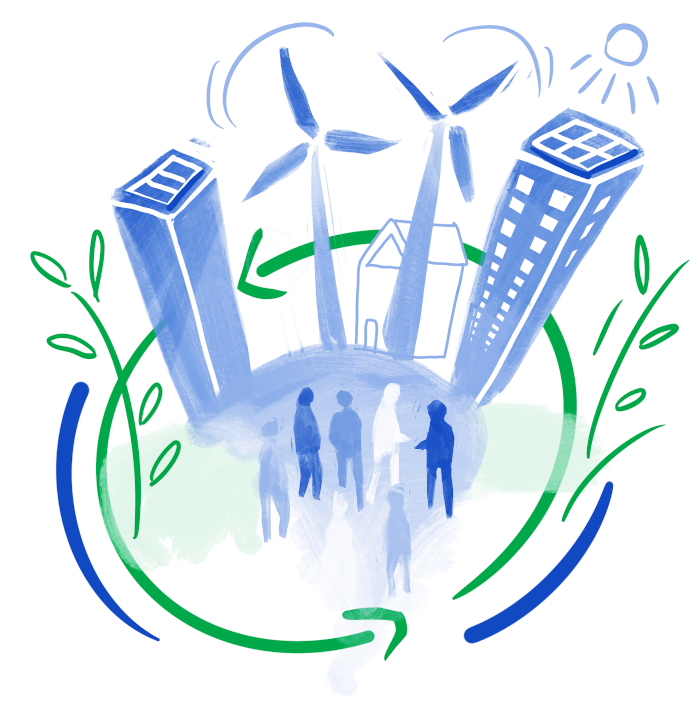Energy Democracy

Current structure of power supply in Germany
In 2017 the German energy sector emitted 308 million tons of CO2. This amount signifies 39 % of all German CO2 emissions [1]. The "energy sector" refers to all electric power generation that supplies the public grid. For 2018 there are only estimations so far. According to these the energy sector emitted 299.3 million tons of CO2 which are 35% of all German emissions [2]. Accordingly, we also don't have clear figures for 2019. First estimations of 'Agora Energiewende' suggest that the CO2 emissions of the energy sector dropped to 223 million tons (27,5% of Germany's total emissions). Based on these estimations the power consists of ~40% renewable energy, ~22% mineral coal and natural gas, ~19% lignite and ~12% nuclear power. At the same time lignite power creates more than half (116 million tons) of the CO2 emissions from power generation3].
Dencentral grassroots energy transition
We need a fast and fundamental transition to achieve the drastic reductions of greenhouse gas emissions which are especially necessary in the energy sector. The most important step is the exit from fossil-fuel energy, notably lignite. Renewables can partly compensate the loss of power, but there is no way around a reduction of energy consumption. This is not negotiable: On the one hand the growth of renewables is the subject to certain technological and economical limitations (although right now those are far from being reached). On the other hand fossil fuels cannot be a serious option in the face of (depending on the calculation) already surpassed or almost reached CO2 budgets of germany. Neither is importing power, since Germany's neighbouring countries are even slower when it comes to building up renewable energy production. To ensure that the remaining energy resources are distributed fairly, i.e. that the most solvent (energy) needs are not exclusively satisfied, thus preventing energy poverty, a far-reaching [democratization of the energy economy is unavoidable. (More on this in the next section)
What does "energy democracy" mean?
The principles of energy democracy are a collective and decentralised organization, that suplies energy based on renewables. The collectively decided needs are determined by the technical realization, the amount of produced energy, as well as its purpose. Thus, consumer participation in a grassroots way is vital. The citizens will support the decisions made on a local level and with the use of e.g. collectives or participatory discussion formats in municipalities. This allows benefits and costs to be shared fairly. With citizen*energy, the supply can be shaped socially just and ecologically.
- Umweltbundesamt: Kohlendioxid-Emissionen (2019, abgerufen 31.1.2020) https://www.umweltbundesamt.de/daten/klima/treibhausgas-emissionen-in-deutschland/kohlendioxid-emissionen#textpart-3
- Umweltbundesamt: Treibhausgase 2018 nach Gas und Kategorie (2019, abgerufen 31.1.2020) https://www.umweltbundesamt.de/sites/default/files/medien/2294/bilder/thg_2018_nach_gas_und_kategorie_0.jpg
- Agora Energiewende (2020): Die Energiewende im Stromsektor: Stand der Dinge 2019. Seiten 17f und 25f. https://www.agora-energiewende.de/fileadmin2/Projekte/2019/Jahresauswertung_2019/171_A-EW_Jahresauswertung_2019_WEB.pdf
- Kunze, Conrad / Becker, Sören (2015): Wege der Energiedemokratie, Stuttgart: ibidem-Verlag
- Heinrich-Böll-Stiftung: Radical Realism for Climate Justice - A Civil Society Response to the Challenge of Limiting Global Warming to 1.5°C, Kapitel 1 und 2 (2018) https://www.boell.de/sites/default/files/radical_realism_for_climate_justice_volume_44_all_2.pdf